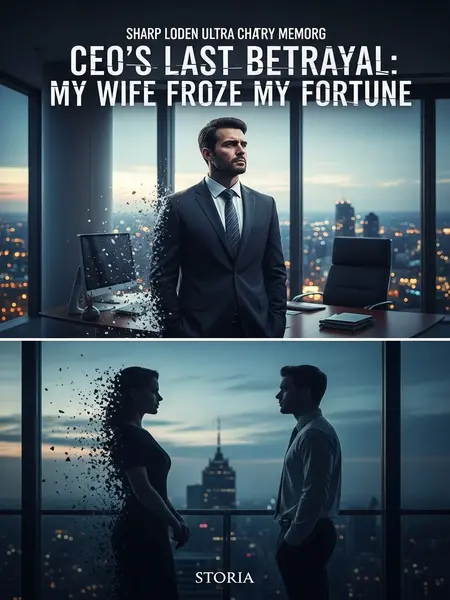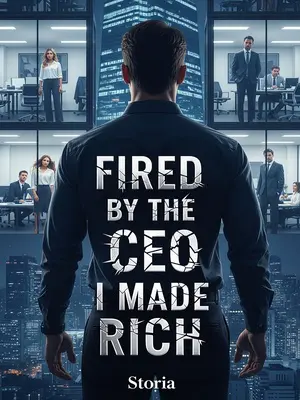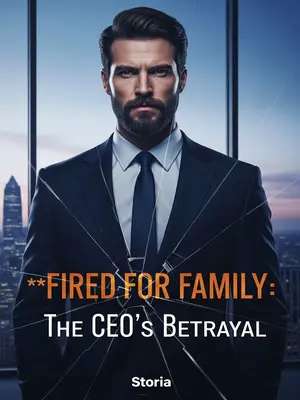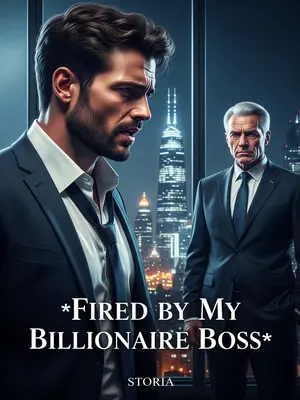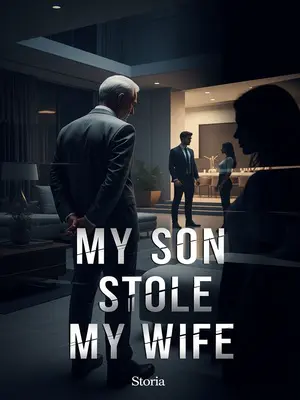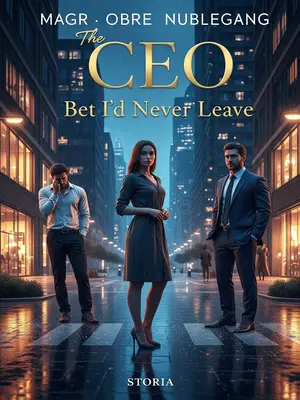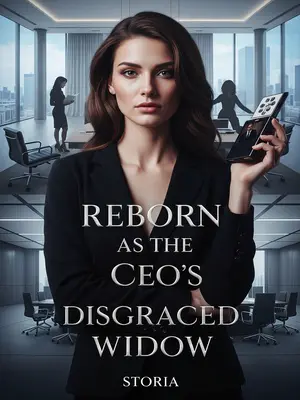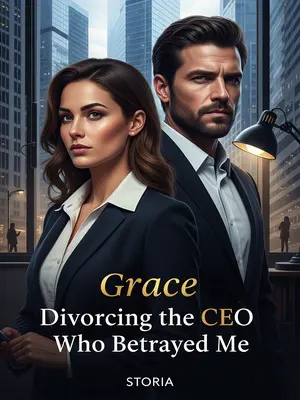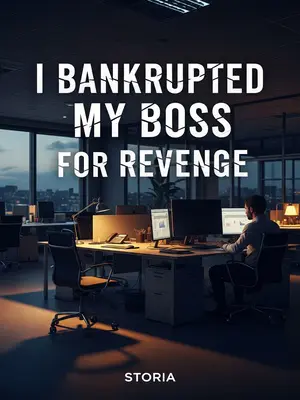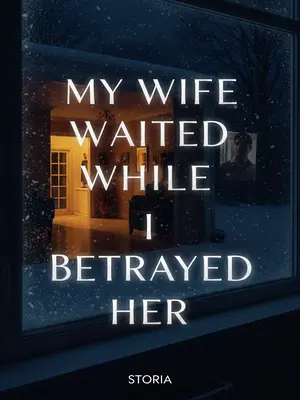Chapter 2: Betrayal and Battle Lines
Even with Natalie guarding the door, Mr. Graham suddenly barged in. The doorknob rattled, then the door flew open. Mr. Graham’s presence filled the room—sharp suit, sharper eyes, a swagger honed by years clawing up the ladder.
He was the most powerful person in the company after me, and the most likely to betray me. He’d come up through sales, a real closer. I’d trusted him with major accounts, watched him charm board members and bulldoze rivals. But ambition like his had a way of turning on its leash.
Almost instantly, Natalie whipped off her blazer and covered the trash can. She moved fast—her hand steady even as her face turned crimson. She shot me a pleading glance, silently begging me not to make a scene.
Mr. Graham took in Natalie’s disheveled look and sneered, “So this is what you do in your office all day? Need something, the assistant does it; don’t need it, you do the assistant, huh?”
His tone was pure venom. I knew this rumor would be all over Slack by lunch—a new reason for my enemies to circle.
I said quietly, “Watch your mouth.”
My voice was low, barely above a whisper, but the room seemed to freeze. The edge was still there, somewhere deep inside me.
“Polite? Do you deserve it?”
His lip curled, anger barely held back. The room felt smaller, air thicker.
He jabbed a finger at my chest, cursing me in front of all the shareholders: “We signed the deal with you because we trusted you. But all these years you’ve been inflating revenue, pumping the valuation. Think I don’t know? You’re nothing but a lapdog, and everyone here knows it. I hope you choke on your own lies.”
He was shouting now, so loud I wondered if the walls could contain it. Somewhere down the hall, someone probably paused, listening in.
Mr. Graham flung the new proposal at me. The folder smacked my chest, papers fanning out across the floor. I let them sit there, untouched.
I said nothing. Words felt pointless. There was nothing I could say to make this right—not anymore.
I was the one who betrayed him first. I’d promised him a seat at the table, a share of the prize. I’d gone back on my word. He had every reason to hate me.
I had truly valued them before, wanted to ride the waves together. We’d started in a cramped co-working space, eating cold pizza at midnight, dreaming of changing the world. I thought we were building something together. I’d been wrong.
But now, through the crack in the office door, I saw all the employees hated me. Their faces—once eager, now hard and cold—watched through the glass. I saw whispers, sidelong glances, a pack mentality forming. Phones hovered at their sides, a few faces half-hidden behind screens, ready to capture my downfall for the group chat.
I forced a smile: “If you keep making trouble, I’ll call the cops. Hit me if you dare, otherwise get out. You don’t want a criminal record, do you?”
My thumb hovered over 911. Even my voice sounded hollow—projecting authority I no longer felt. In America, sometimes the threat of police is the last tool a boss has left.
Mr. Graham looked surprised, muttering, “You really don’t care about your reputation anymore?”
He studied me, searching for the old pride, the fire. All he saw was a man with nothing left to lose.
He was right. The old me would have cared—would have fought to the last for respect. Not anymore. My priorities had shifted, hard and fast.
For my wife and child, I had already lost all face. I’d mortgaged my reputation and legacy for their safety. There was no dignity left to defend.
How pitiful. That word echoed in my mind, not just from him, but from my own reflection.
My wife was divorcing me. It felt surreal—like watching someone else’s life unravel on daytime TV. I’d always thought we’d weather anything together.
I must have loved her deeply. The memories were fading, but the ache remained. I’d built so much of my world around her—surely, that had to mean something.
Because on my wedding ring, there is an inscription: “Only you—I hope to meet again in the next life.” I caught the glint of the ring under the desk lamp. The inscription, barely legible now, was proof I’d once been certain about love. I turned the band on my finger, searching for a feeling to match the words.
Yet sadly, I could no longer get along with her. We’d grown into strangers sharing a last name, the silences between us too wide to bridge. Every conversation ended in misunderstanding or tears.
The first time I sensed something was wrong was when she nestled in my arms, walking with me by the river. That memory is clear—maybe because it’s one of the last good ones. The river was swollen from spring rain, the banks muddy. She leaned into me, our steps in sync. Someone was setting off fireworks. Under the dazzling bursts, she turned, smiled, reached out her hand to me, and said, “I’m free today.”
The air smelled like spent gunpowder, sweet grass, and hope. Her smile was wide, but her eyes were sad. I felt like I should have understood what she meant. I didn’t, so I just held her hand and watched the fireworks.
She squeezed my fingers, her grip tighter than usual. I smiled, thinking that was enough. But inside, a cold knot was forming. Her shoulders shook, just a little. She blinked hard, looking away. The booms in the sky couldn’t drown out the quiet between us.
I saw tears slip from the corner of her eye, but I didn’t know why. I felt helpless, standing beside her, unable to read her pain. The river carried our reflections downstream, distorted and unreachable.
After that unhappy date, Natalie told me the truth. She sat across from me in my office, voice soft, eyes kind. She didn’t sugarcoat it. The truth hit like a sucker punch.
Fifteen years ago, during the bankruptcy wave in Southern California, once-mighty clients went under in half a month. The recession swept through like a tornado—factories shuttered, friends laid off, hope evaporated. I was just a kid then, but the memory lingered: watching giants topple, powerless to stop it.
At year’s end, when collecting debts, they still acted high and mighty, owed us money, yet wanted us to keep supplying them. Pride kept them posturing, but desperation was in their eyes. I’d driven up and down I-5, hat in hand, begging for payment.
That day, I left a suicide note for my wife and went alone to Los Angeles. I remember standing in our kitchen, pen in hand, scrawling out my regrets. I didn’t have the heart to say goodbye in person. Just a note on the counter, the ink still smudged by tears.
When the client’s CEO dodged small suppliers, I held a knife in my left hand and a gas canister in my right; no one dared stop me. It was desperation, not heroism. The security guards eyed me warily, but let me pass. Inside, the party was in full swing—crystal flutes, shrimp cocktails, oblivious laughter.
They’d prepared a lavish New Year’s party, but in the end, they used five hundred boxes of fireworks to pay off their debt to me. It was the kind of settlement only the desperate make. Fireworks instead of cash. I drove home with the trunk loaded, the backseat sagging with cardboard boxes. Every pop and crackle on the highway felt like a warning.
I risked my life to handle the fireworks and brought home a bag full of cash. I sold most of the fireworks to a cousin who ran a roadside stand, pocketing what I could. The rest, I stashed in a duffel bag, tossing it on the apartment floor.
At my mother-in-law’s house, her family scolded my wife for being blind, told her to divorce me and cut ties. The living room was full—TV blaring, faces twisted with anger. I was the fool who’d dragged their daughter down, the bad bet they wanted to erase.
Seeing my beloved humiliated, I threw the cash into the air. The bills fluttered down onto their stunned faces. For a few seconds, the world went silent, save for the soft rustle of falling bills. Money rained down like confetti, turning rage to stunned disbelief.
I kept a box of fireworks and set them off. I marched into the yard, the neighbors already peeking out. I lit the fuses, one after another. The night exploded with color—red, white, blue, gold. The neighbors leaned out of their porches, red Solo cups in hand, gawking as the sky exploded in color.
I reached out to her and asked, “Will you get the marriage license with me tomorrow—are you willing?” I didn’t kneel, didn’t make a speech. Just held out my hand, eyes pleading for a fresh start.
She laughed and cried, holding my hand: “I’m free today.” She collapsed into my arms, laughing through her tears. The fireworks boomed overhead, and for a moment, the world belonged to just us.
Under the brilliant fireworks, the bills danced in the air. Neighbors scrambled for the money, yelling and whooping. Someone cheered. Someone else called me crazy. My mother-in-law just stared, speechless.
People scrambled to pick up the money, and I wrapped my arm around her waist and kissed her deeply. That kiss was all promise—wild, messy, real. The smell of gunpowder and new beginnings clung to us both.
Only then did I understand: at that moment, she wanted me to kiss her. It took all of that—the chaos, the spectacle—for me to see what she needed. I wish I’d known sooner.
But I had already forgotten all of this. The images flickered on the edge of my mind, like a movie I’d seen long ago. The details slipped through my fingers.
I tried to have Natalie tell me my love story, but she was always an outsider. She read the notes I’d made, recited the facts, but her voice lacked the music. Some stories just can’t be borrowed, no matter how kind the teller.
As my protégé, she could save my business, but not my love. She took on my burdens, guarded my secrets, but there were places she couldn’t follow.
I forgot more and more, and let my wife down again and again. I watched her face harden with each missed anniversary, each forgotten inside joke. She gave up trying to remind me. I could hardly blame her.
She would always look at me, disappointed: “How did we end up like this?” Her words were always soft, never angry. That made them hurt all the more. The sadness in her eyes was a mirror of my own failures.
I couldn’t answer. My mind fumbled for the right words, but nothing came. Silence became our new language.
I opened my mouth bitterly, but in the end, fell silent. The air between us felt like winter—cold, brittle, empty of warmth. I wanted to say so much, but all I managed was a half-hearted sigh.
What kind of romance must a man have had, to break a woman’s heart again and again, only to be met with a gentle question in the end? That question gnawed at me. What kind of love leaves a woman wounded, but still reaching out with tenderness? Maybe I’d never really know.
Sadly, I no longer remembered. The memories were gone, but the ache remained—a ghost I couldn’t banish.
All I could say was that I was busy with work and had drifted away from her. It was a weak excuse, but the truth. I’d chased deals, not dinners. Briefings, not birthdays. The American hustle had left me empty-handed at home.
I took a wedding photo—in it, I’m holding her, both of us smiling happily. That photo, tucked behind my desk lamp, was a snapshot of a happier time. The smile on my face was easy, unforced. Hers was radiant.
Staring at the photo, I murmured, “I don’t remember anymore—whether it’s the heartbeat or the happiness, I’ve forgotten everything… But I promise, I will protect her for you.” My words were a vow to the man I once was. Even if I couldn’t recall the joy, I’d see her safe, no matter the cost.
This relationship was hard to protect. The law firm’s letters stacked up in my inbox. Even friends stopped asking about us, too uncomfortable to pick a side. Some things can’t be fixed with apologies or money.
She had a lawyer send a divorce agreement. The envelope was thick, formal, the signature line like a wound. The legalese was colder than any fight we’d ever had.
I couldn’t get divorced—not yet. Timing mattered. Everything hinged on the next deal, the next round of funding. If I played it wrong, she’d lose everything I’d tried to protect.
I was preparing for financing, wanting to leave her millions in cash assets. It wasn’t just about the money—it was about leaving something behind that mattered. That could stand as proof that once, I’d been good for something.
If we divorced now, the investors would think I was transferring assets. They’d circle, sniffing for weakness, ready to call in lawyers and freeze the accounts. My family would be left in the dust.
I told her to bring up the divorce later. I tried to explain, to ask for time. My texts came out clipped, the words failing to capture the urgency.
She replied, “If you won’t divorce, I’ll sue. If the love is gone, just be decisive and divorce. Don’t occupy my life and refuse to leave. I never thought you could be so shameless.”
Her words landed like punches. I deserved every one of them. There’s no honor in dragging things out, but I had no choice.
Looking at her message, I laughed at myself. A bitter chuckle escaped, startling even me. I wondered what kind of man I’d become—so much calculation, so little warmth.
She was overestimating me. She thought I was playing games. She didn’t know how much I’d already lost.
Before… I closed my eyes, desperate for a memory that wouldn’t come. The past was a locked room with no key.
How I wish I still remembered before. Sometimes, I’d wake up convinced it would all come back. It never did.
Seeing I didn’t reply, she sent another message: “My business is doing great now, I don’t need to rely on you.” Her confidence stung, even though I was the one who’d secretly fueled her success. I was proud of her, even if she’d never know.
I put down the phone and said to Natalie, “She’s humiliating me.” Natalie perched on the edge of my desk, arms crossed. She watched me with a mix of sympathy and frustration.
Natalie said softly, “She doesn’t know all the orders are from you. Transferring assets like this is a loss—taxes, transport, and costs eat up most of it. She can only get thirty percent of your money.”
She laid out the math, cool and precise. The numbers were cruel—so much lost to bureaucracy and loopholes. But at least it was legal.
I said, “Thirty percent is fine. Legality is most important. Don’t let her get into any legal trouble.”
Even in the end, I wanted to make sure she was safe. Clean hands, clean conscience.
Natalie nodded, put away the signed documents, and sighed, “You burn money for her faster than burning it with fire. The investors are here. Let’s go to the conference room.”
She straightened my tie, brushed invisible lint from my lapel, and opened the door. The hallway buzzed with anticipation.
I knew everything was about to end. The weight of it pressed on my chest. I tried to stand tall, but my knees shook.
After signing the financing agreement today and once the funds arrived, I would burn the money legally. This was my last act—the final play in a game I’d spent a lifetime mastering.
She would get that thirty percent and live worry-free for life. Maybe she’d buy that lake house in Michigan she always dreamed of. Maybe our son would go to college debt-free. That was enough.
And I would go to Switzerland for assisted suicide, bearing infamy after death. No redemption, no obituary full of praise. Just a quiet exit, my name dragged through the mud if that’s what it took.
The investors might want to dig up my corpse and grind my bones to dust. They’d sue my estate, bad-mouth me to the media, maybe even try to rewrite history. Let them try.
But it doesn’t matter. Business is a jungle. If you’re not the wolf, you’re the prey. I’d known that since my first job stocking shelves at the Piggly Wiggly.
He wants my interest, I want his principal—the only difference is I’m betting my life. This was the ultimate American gamble. All in, no looking back.
I no longer remembered how to tie a tie. Natalie patiently helped me tie it and straighten my suit. Her hands were gentle, fingers deft. She worked in silence, smoothing the collar, making sure the Windsor knot was straight. It was such a small thing, but it made me feel human again.
She said softly, “Today is your last battle. I’ve admired you for many years. I never thought you’d die bearing infamy.” Her eyes shone with pride, and a hint of grief. She was bracing herself, too, for what came next.
I asked, “Did I disappoint you?” It was the kind of question you ask when you’re not sure you want the answer. I studied her face, searching for the truth.
She shook her head. “Being your protégé is the greatest honor of my life. You may not remember your life, but that’s all right. I will always remember.” She squeezed my shoulder, her loyalty unshaken. Her words were a balm.
I said, “I prepared some money for you. After I die, the investors definitely won’t let you off. Escape to another state—there are people there who owe me favors. They’ll protect you. I don’t remember them, but from my journal, I’ve already arranged it for you.”
I handed her an envelope—names, numbers, bank accounts. She nodded solemnly, tucking it into her purse like a sacred trust.
She finished the tie and smiled. “Let’s go.” She held out her arm, and I took it. For a moment, I almost felt like myself again.
We left the office. Under the employees’ hateful stares, I walked to the conference room. It was a gauntlet—every whisper, every narrowed eye, another stone on my back. Natalie walked beside me, unflinching, her chin held high.
The investors were brought in by Mr. Graham. He smiled and reached out to shake my hand. His grip was firm, his smile forced. The room was thick with tension, the air-conditioned chill doing nothing to cool tempers.
At the moment we shook hands, Natalie’s phone rang. She answered, her face turning grim. She stepped aside, the phone pressed tight to her ear. I watched her expression darken, dread building in my gut.
The employees seemed to have expected this; their hateful faces turned gleeful. You could feel it ripple through the room—a sick thrill, the sense that they were about to watch a king fall.
Natalie turned and whispered in my ear, “The company account has been frozen.” Her breath was warm, her words a knife in the dark. I staggered, clinging to the edge of the conference table.
A bad feeling crept over me. It was the kind of fear that makes your mouth go dry, your heart race like you’re back on the football field, last play of the game.
She continued, “Your wife applied to the court to freeze it—for the divorce property split.” My chest tightened. The irony was almost poetic. All my careful plans, undone in an instant.
How ironic. A bitter laugh bubbled up, too raw to hide. The universe had a twisted sense of humor.
I no longer remembered her goodness. All I could see was the pain in her eyes, the weight of all my failures pressing down on us both.
At the end of a life spent for her, my last memory of her was… Was this it? All my sacrifice, repaid in suspicion and betrayal?
She gave me the most fatal blow. It wasn’t malice—just self-preservation. The only way to survive in this world was to fight back.
Mr. Graham seemed to have anticipated all this. He told the investors, “You came at a bad time today. Our boss is in a divorce lawsuit with his wife. The company accounts are all frozen.” He delivered the news with relish, his voice dripping with triumph. The investors’ eyes hardened, their interest fading fast.
The investors frowned and shook off my hand. They muttered among themselves, eyeing the exit. I could feel the deal slipping away with every heartbeat.
Natalie quickly led them to the conference room, begging for time to investigate. She spoke fast, her hands slicing the air as she explained. I watched her, grateful and guilty all at once.
I looked at Mr. Graham and asked coldly, “Did you use my wife?” He met my gaze, unflinching. The lines around his mouth deepened.
He shrugged. “You used us first.” The words stung, because they were true. In the jungle, there are no innocents.
Several vice presidents came out, glaring at me with hatred. Their arms were crossed, jaws clenched. Loyalty had curdled into something uglier.
The employees couldn’t help but laugh, treating me like a clown. There was no hiding the schadenfreude in their eyes. It was a feeding frenzy.
I didn’t remember what heights I’d once reached. The corner office, the country club invitations, the respect—they were all gone. I was just another man with a target on his back.
But I wasn’t dead yet. There was still fight left in me. I wasn’t going to go down without a struggle.
The struggle for supremacy had already begun. The battle lines were drawn—every man for himself. The smell of coffee and sweat mingled in the air.
In front of all the employees and vice presidents, Mr. Graham listed my crimes. His voice rose and fell, weaving a story of betrayal, greed, and failure. The room hung on every word.
“We followed you back then because you were worth it. But now? Out of ten confidential projects, you showed eight to the investors, always raising money.” The accusation rang out, undeniable. I’d been reckless, desperate, hoping to buy time with other people’s dreams.
“You didn’t use the raised money for new R&D. Most of it went to your wife’s factory. You think you did it secretly?” The crowd murmured, eyes narrowing. The truth was out, and there was no taking it back.
Mr. Graham spoke passionately, spittle flying, while I remained calm: “It’s all legal. You can call the cops.” My calm was the last armor I had. The law was on my side, even if morality wasn’t.
He sneered, “Of course it’s legal. But if you want to play dirty, I’ll play with you. Your wife thought her business was booming, just got a big order from my friend. Now I’ll have her freeze your assets herself. You’re her biggest funding chain. When her cash flow breaks and she defaults and goes bankrupt, we’ll buy her company cheap. That’s legal too, right?”
He laid out his plan, step by step. I had taught him well.
I asked, “Why would she listen to you?” I needed to know—was she truly lost to me, or just desperate for an ally?
Mr. Graham shrugged. “She said you treat her badly now. I told her you’re hot with your assistant every day, always raising money, probably planning to run off with her.” His words were poison, but they worked. I saw the hurt in her eyes every time she looked at Natalie and me.
I nodded. It seemed my wife believed it—because I had disappointed her too many times. I couldn’t blame her. Trust, once broken, is almost impossible to repair.
Mr. Graham laughed. “She was scared, so she rushed to the court to apply for the freeze.” His laughter was harsh, echoing off the glass walls. I wondered if he felt any satisfaction, or if this was just business as usual.
The vice presidents had already surrounded me. They stood shoulder to shoulder, arms crossed. For a second, I wondered if I should be afraid for my safety.
On their faces, besides hatred, was disappointment. The disappointment hurt more than the anger. I’d been their leader, their inspiration. Now, I was just another cautionary tale.
Mr. Graham sighed deeply. “Do you remember why we followed you?” His voice dropped, the bravado gone. He sounded tired, almost nostalgic.
I didn’t answer—because I had forgotten everything. The silence stretched, awkward and final.
He continued, “When you led us to change jobs and do projects, the boss promised to give twenty percent as a bonus, but later faked the accounts and reneged. You didn’t want us to take the risk, so that night you sold your house and brought us a box of cash.”
The memory flickered, half-formed. I remembered the boxes, the tears, the way hope felt contagious.
“You turned the team’s debts into your own. That night, we grown men hugged the money and cried, and you comforted us, saying it was okay, you’d get the money back.” I could almost hear the sobs, smell the cheap whiskey we drank to celebrate. Those men had trusted me with everything they had.
“From that day, you were the person I admired most. The more I respected you then, the more I despise you now.” His words were a knife, but I took it without flinching. I’d earned his anger.
Mr. Graham spoke with deep emotion, moving the crowd. The room grew quiet. Even the gossipers fell silent, caught up in the drama.
Sadly, I only trusted myself. In the end, that was my fatal flaw—never letting anyone all the way in. Now, I had no one left but Natalie, and even she couldn’t save me from myself.
Before I forgot most things, I wrote down all their characteristics in my journal. Page after page of observations, strengths, weaknesses, warnings. The final notes of a general, prepping for a war he’d never finish.
My wife: gentle and kind, but not to be entrusted with everything. A note written in love and caution. She was pure-hearted, but the world was not.
As for Mr. Graham, he could share prosperity, but not adversity. He was the kind of man you wanted beside you in victory, but nowhere to be found in defeat.
Since I had once been deeply respected by these people, I had to trust my own judgment. Even as my mind failed me, I clung to the wisdom of my younger self. If he believed in something, maybe it was still worth fighting for.
Trust the self who once stood at the top. That man had faced worse odds and won. Maybe, just maybe, he could pull it off one last time.
I had promised my former self to leave his beloved family millions. A promise is a promise—even if you can’t remember why you made it.
No matter what, I had to do it. I squared my shoulders, ready for the next blow. There was no quitting now.
Natalie came out of the conference room, her face serious. She took my arm, wanting to lead me away from the crowd. She moved with purpose, her grip firm. I leaned into her, letting her guide me past the hostile stares.
Mr. Graham said unhappily, “Don’t you see we’re talking?” He stepped into our path, trying to reclaim authority. Natalie didn’t even slow down.
Natalie glanced at him. “Fire me if you dare. Who are you to order me around?” Her voice was icy, defiant. She dared him to challenge her. The crowd murmured—no one had ever spoken to him like that before.
Mr. Graham was speechless. He blinked, mouth opening and closing. Natalie brushed past him, not looking back.
She took me back to the office. Outside, people still watched me like wolves eyeing their prey. The glass walls felt like a cage. I could feel their hunger—waiting for a sign of weakness.
Natalie asked nervously, “Are you okay?” She poured me a glass of water, hands shaking just a little. I nodded, though my heart was pounding.
I asked, “What did you say to the investors?” She perched on the corner of my desk, eyes scanning the room as if expecting an ambush.
Natalie said, “I promised him the account would soon be unfrozen. We must get your wife to submit the unfreeze application quickly. I’m afraid we have to let her know the truth. Also, the investor requires to see the signed divorce agreement today. He doesn’t care about anything else, as long as the company’s assets have nothing to do with her.”
She rattled off the checklist, efficient and relentless. Her loyalty was my last shield.
I sighed deeply. “Let me think about it.” I rubbed my temples, trying to summon clarity. The clock on the wall ticked louder, every second a countdown.
Natalie shook her head. “Don’t think anymore. I’ve already contacted your wife to come over. Let’s make things clear. I’ll go print your divorce agreement.” She was always two steps ahead, anticipating needs I didn’t know I had. The hum of the printer echoed down the hall.
I sat on the sofa, watching Natalie busily working. The leather creaked as I shifted, memories swirling just out of reach. My hands fidgeted in my lap, restless and useless.
Even if I wanted to help, I could no longer help. I tried to recall how to log into the company portal, how to check the bank balance. The steps were gone, erased by disease.
Now, the only useful thing about me was that, legally, I still had control over the company. A signature, a title on a door. That was all that stood between my family and ruin.
When the office door opened, I saw my wife enter with a cold face. She was dressed for business—navy blazer, hair pulled back. Her jaw was set, eyes rimmed red. She looked like she hadn’t slept in days. I noticed her wedding ring spinning on her finger, her knuckles white around her purse strap.
She seemed impatient. “What do you want?” Her voice was flat, brittle. She didn’t waste a single word.
I didn’t know how to face her expression. Guilt and longing warred inside me. I stared at my shoes, afraid to meet her gaze. Because I no longer remembered loving her—everything I did was just to be worthy of myself.
Natalie handed her a sorted document, only to be met with a wary glare. The file shook in her hand. She eyed Natalie with suspicion, like a cornered animal.
She snapped, “Don’t let your little vixen hand me any documents. I’m not interested. Shameless—now you don’t even bother to hide your affair. Even the divorce agreement is handed to me by her.” The accusation was loud enough to carry into the hall. I winced, wishing I could take the sting from her words.
Natalie cut her off: “This isn’t the divorce agreement. Shut up and read it. We don’t have much time.” Her tone was harsher than I’d ever heard. Even my wife seemed stunned, the fight draining from her eyes for a moment.
Natalie’s attitude was off. Usually, she was polite, bordering on reverent. Today, she was all business, no patience for drama. She’d called her “ma’am,” fetched her coffee, deferred to her wishes. But this was different. The stakes were too high for pleasantries.
But now, her face was full of impatience. She glanced at her watch, lips pressed tight. Every second counted. Maybe in her heart, she couldn’t accept anyone betraying me. Loyalty cut both ways. She’d thrown in her lot with me, for better or worse.
My wife was shocked by her attitude, took the document, and read it, while Natalie quickly sorted the divorce agreement and said, “All the orders for your factory come from us, and the medical records are included. If you don’t believe it, you can verify it yourself.” She fished another folder from her bag, sliding it across the desk. Evidence, airtight and undeniable.
My wife stared at the document, covering her mouth in disbelief, then looked at me. Her eyes searched mine for something familiar. I couldn’t give her what she wanted.
In an instant, tears burst from her eyes. She sank into the nearest chair, shoulders shaking. I ached to comfort her, but my body wouldn’t move.
She sobbed, “You… why didn’t you tell me?” Her voice was small, raw. The kind of pain that leaves scars.
Natalie retorted, “Are you trustworthy?” Her words cut, but there was no malice—just urgency.
My wife cried, “Of course I am! I’m more trustworthy than you! He’s my husband—it’s not your place to protect him!” She glared at Natalie, defiant even through her tears.
Natalie said impatiently, “Apply to the court to unfreeze the account immediately, and sign the divorce agreement. Hurry up. I’m telling you again, we don’t have much time. Remember, don’t tell anyone.” She slid the papers across the desk, tapping the signature lines. Her fingers drummed out the countdown.
My wife took the document, wiped her tears, and walked over to me. She stopped just short, her body trembling with the effort to hold herself together.
She seemed heartbroken, couldn’t help but lower her head, holding my face in her hands. Her palms were cool, her touch feather-light. I closed my eyes, wishing for a flicker of memory.
She cried and asked, “Do you really not remember me?” Her words were a plea, not an accusation. “You don’t remember my hobbies, my tastes, everything about us. You used to know my coffee order by heart. Now you can’t even look me in the eye.”
Her voice broke. The finality in her words was devastating.
She wiped her tears, her sobs trembling more and more: “Sorry, I thought you didn’t love me anymore.”
I wanted to reach for her, to pull her into my arms and make her believe it was all going to be okay. But I just sat there, helpless.
I didn’t know how to answer. Natalie had already thrown the extra documents at her, yelling, “Is this the time to talk about this? Go do your business, and remember to keep it secret!” Her voice was sharp, impatient. There was no time left for old wounds.
My wife was startled by the outburst, finally came to her senses, hurriedly signed the divorce agreement, glanced at me reluctantly, and quickly left the office. She paused at the door, her hand lingering on the frame. Then she was gone.
Only Natalie and I were left in the office. The silence was thick, suffocating. I slumped back, exhaustion sweeping over me.
I said, “You went too far.” My voice was hoarse, the words barely audible.
She tidied the desk, clenching her teeth tightly. Her hands shook as she stacked the papers, every movement controlled fury.
Her body was trembling, as was her voice, holding back sobs: “I hate to see heroes in decline. When I was a kid, everyone said I was like a boy. I hated seeing my favorite football players retire, hated when legends faded away, hated when the people I looked up to lost their spark…” She stared out the window, eyes glistening. Her confession was raw, honest—something I’d never heard before.
“In my heart, what I can’t accept most is heroes in decline. A magnificent life should have the best ending.” Her voice shook, but her resolve was ironclad.
“Everyone outside treats you as a coward. They think they can defeat you—they dream of stepping on you.” She balled her fists, the anger finally spilling over.
“If you lose today, all the reputation you once had will become stepping stones for these clowns.” Her disgust was palpable. She looked at me, willing me to fight back.
Natalie wiped away her tears, her face full of determination: “You once stood at the top. Even if you can’t remember, I will walk with you to the end with pride. Nobody should get to trample a hero’s legacy.” She straightened her shoulders, head high. In that moment, she was more than an assistant—she was my last ally.
She helped me up, held her head high, and accompanied me to open the office door. Her grip was strong, steady. Together, we stepped into the unknown, whatever came next.
Outside, everyone looked at me in unison. Every eye in the office fixed on us, some with pity, most with barely concealed glee. It was judgment day.
Mr. Graham held his phone, his mouth agape, and shouted in disbelief: “You’re not even forty and already have Alzheimer’s?”
The word hung in the air—Alzheimer’s. My legacy, my shame, my last fight—all exposed. And the wolves were already circling.
